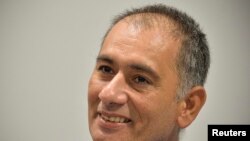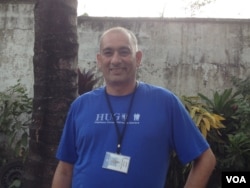Cuban doctor Felix Baez, who contracted Ebola in Sierra Leone, has recovered and returned to the country to continue fighting the deadly virus.
Baez had been caring for Ebola patients at a treatment center in Kerry Town, just outside the capital city, when he fell sick in mid-November.
After being treated in Geneva with the experimental drug Z-Mab and a Japanese drug used to treat the flu, Baez managed to recover quickly, he said.
He’s happy to be alive and happy to be back.
"When I was a child, my father said, 'When you begin work, you finish.’ That is the rule, in my mind," Baez said. "I need to complete my work. Many friends in Sierra Leone and Cuban doctors and nurses are waiting for me."
The Cuban medical team’s leader, Jorge Delgado Bastillo, applauded that attitude.
"He showed the position of health workers from Cuba to continue working here," Bastillo said of Baez. "That is true, he was very sick, but he recovered very well – and now has come back to continue working."
Health care workers at risk
Baez still isn't sure how he got sick. He'd worked in full protective gear, the recovered doctor said, with "no negligence, no violation. Everything is o.k., but I don’t know … [how] I was infected with the Ebola virus."
World Health Organization spokesman Pieter Desloovere said the United Nations agency investigated Baez’s case but he was not authorized to talk about it.
However, Desloovere said health care workers commonly have been infected while removing their personal protective gear.
Though they’ve been instructed to avoid touching their eyes, nose, mouth and open wounds when working with Ebola patients, "once people are working long hours, it’s easier to make a mistake," Desloovere said. "You’re sweating and start undressing, and you forget and touch your eyes."
The virus spreads through direct contact with an infected person’s bodily fluids.
The latest WHO report indicates that out of the 8,641 confirmed deaths from the current Ebola outbreak, 3,145 have occurred in Sierra Leone. At least 221 of those were local or international health care workers.
WHO reported a total of 828 health worker infections and 499 deaths among Sierra Leone and the two other intense-transmission countries, Guinea and Liberia.
Undone by sense of urgency
Most infections among health care workers occur in local centers where they’re treating people in their own community, not in Ebola treatment centers, Desloovere explained.
"It’s more of an urgency. They want to help out a neighbor or family member," and they may not think to put on personal protective equipment, Desloovere said.
Although the number of new Ebola cases is falling rapidly, the WHO spokesman warned that people still needed to take all necessary precautions.
A total of 165 Cuban medical workers are in Sierra Leone, and they plan to remain until April.






